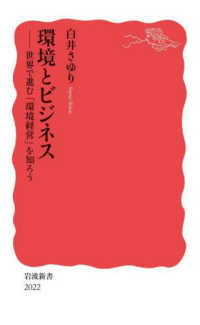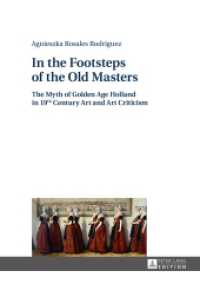- ホーム
- > 洋書
- > 英文書
- > History / World
Full Description
This book explores the path that led to the Treaty of Rapallo (1920) between Italy and the new Kingdom of the Serbs, Croats and Slovenes, later the Kingdom of Yugoslavia, in the aftermath of the First World War, when the territories of the former Austro-Hungarian Empire were allotted to new and existing states, with regard as far as possible to the nationalities of the people living in the various territories in addition to the future of Montenegro and Albania.
Based on vast archival documentation and published sources, the contributors to this book discuss the nature of the disputes which arose in the Adriatic area, often as the result of the inhabitants of the different territories being of several nationalities, and examine how the disputes were concluded. The book charts the disappointments of both Italians and Yugoslavs, the Italians disappointed that the terms of the Treaty of London of 1915, which promised Dalmatia to Italy in return for Italy entering the war against the Austro-Hungarian Empire, were not fulfilled. The Yugoslavs were disappointed loosing territories containing large Yugoslav populations. The volume considers public opinion, the words, positions and actions of leading politicians, and the continuing consequences of the settlement, many of them adverse consequences for particular cities and localities.
Presenting a comprehensive approach to the Adriatic controversy, this book will be of interest to those studying European history of international relations, diplomatic negotiations and nationalism, modern history, Central Asian, Eastern European and Russian Studies.
Contents
List of contributors; List of archives with acronyms; Maps. At the origins of the Adriatic controversy: An introduction Part I. The Adriatic question a century later: Reassessing geopolitical expectations and diplomatic realities Chapter 1. Power politics, territory or nationality? From the Peace Conference to the Treaty of Rapallo; Chapter 2. The Slovenes and the controversy over borders with Italy and Austria after the First World War; Chapter 3. The "Fiume enterprise" and the D'Annunzio Legionaries in the Italian Army Documents: The Gen. Pecori Giraldi report (1920); Chapter 4. The impact of the Treaty of Rapallo on Hungarian diplomacy; Chapter 5. The Adriatic question, The Rapallo Settlement, and the end of Montenegrin independence; Chapter 6. Disputed Albania in the diplomatic negotiation of the Treaty of Rapallo Part II. The Adratic question: Intellectuals and public opinion debates Chapter 7. Tomáš G. Masaryk, H. Wickham Steed, Woodrow Wilson And The "Adriatic's" Italy; Chapter 8. Gaetano Salvemini and the Adriatic question from the First World War to the Treaty of Rapallo; Chapter 9. "Soldier of my people": Ante Trumbić and the Adriatic question; Chapter 10. Francesco Salata and the foreign policy of liberal Italy (1919-1920); Chapter 11. The war, Fiume and Rapallo in the literary memory; Chapter 12. The American public opinion on the Adriatic question; Index








